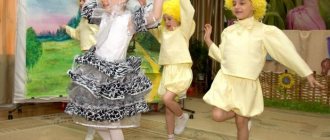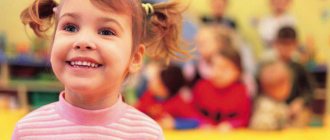Article “Experience in involving parents in the educational process”
Municipal autonomous educational institution
"Kindergarten No. 15"
Experience in involving parents in the educational process
Performed:
Ushkova Yulia Alekseevna
teacher
highest qualification category
Cherepovets, Vologda region
Thesis: the use of diverse forms of work with different categories of parents
The main thing in the work of any preschool educational institution is the preservation and strengthening of the physical and mental health of pupils, their creative and intellectual development, and providing conditions for personal growth. The successful implementation of this large and responsible work is impossible in isolation from the family, because parents are the first and main educators of their child from the moment of birth and for life. In accordance with the Law “On Education”, which states that parents are the first teachers, they are obliged to lay the foundations for the physical, moral and intellectual development of the child’s personality at an early age. In this regard, the position of the preschool institution in working with families is also changing. The basis of interaction between a preschool institution and a family is cooperation, i.e. joint determination of activity goals, joint distribution of forces, means, subject of activity in time in accordance with the capabilities of each participant, joint control and evaluation of work results, and then forecasting new goals, objectives and results [1]. Parents of children going to preschool experience certain difficulties, and therefore our task is to help parents in raising their children. Our interaction with parents involves the exchange of thoughts, feelings, experiences, aimed at improving their pedagogical culture. Improving pedagogical culture resolves the existing contradiction between the educational potential of the family and its use[3].
We begin the organization of work on interaction with parents of children who first arrived at a preschool institution by analyzing the social composition of parents, their mood and expectations from the child’s stay in kindergarten; for this we conduct surveys and individual conversations.
After analyzing parents' answers to the questionnaire, we found that most of them receive the necessary information via the Internet and use random literature. There are parents who purchase pedagogical literature, but they are a minority. Others raise children intuitively and are uncritical of certain manifestations of the child. It is important to intensify and enrich the educational skills of parents, maintain their confidence in their own pedagogical abilities, and spread the positive experience of upbringing in the family: spending family leisure time, following family traditions, experience in hardening children, family reading, etc.
Parents of children attending preschool educational institutions today can be divided into three groups (the parents of our students are involved in them)[2].
The first group are parents who are very busy at work, for whom kindergarten is simply vital. But, despite this, they expect from the kindergarten not only good supervision and care for the child, but also full development, health improvement, training and education, and organization of interesting leisure time. We invite such parents to take part in pre-announced events, for example, a cleanup day.
The second group consists of parents with a convenient work schedule and non-working grandparents. Children from such families might not attend kindergarten, but parents do not want to deprive the child of full communication, games with peers, development and learning. We try to actively involve such parents in the work of the kindergarten.
The third group is families with non-working mothers. These parents also expect from the kindergarten interesting communication with peers, learning skills for behavior in a team, maintaining the correct daily routine, learning and development. We try to make such parents our active helpers. We rely on this parent group in preparing and holding holidays, competitions, exhibitions, etc.
In order to increase the effectiveness of working with children on sensorimotor, speech development, and social-emotional development, we have chosen different forms of work with families.
There are traditional and non-traditional forms of communication between teachers and parents of preschool children, the essence of which is to enrich them with pedagogical knowledge[5]. Traditional forms are divided into collective, individual and visual information.
We use this collective form of work
as group parent meetings (topics: “Game is the leading activity in preschool age”, “Speech development of older preschoolers”).
We use individual forms of work
:
1. pedagogical conversations with parents on topics that interest them, as well as daily individual conversations about the state of health of children, their emotional well-being;
2.consultations with a teacher-psychologist in order to resolve problematic issues; the most interesting questions of parents relate to speech, physical and intellectual development.
In our work we also use visual information methods
: exhibitions of children's works; stands, screens, mobile folders, photo reports are very popular, the parents of our group have organized a VKontakte community for the purpose of exchanging experiences.
Currently, non-traditional forms of communication are especially popular among parents. They are structured like entertainment programs and games and are aimed at establishing informal contacts with parents and attracting their attention to the kindergarten. Parents get to know their child better because they see him in a different, new environment and become closer to teachers.
A classification scheme for non-traditional forms is proposed by T.V. Krotov[4]. The author identifies the following non-traditional forms: leisure, educational, visual and informational.
Leisure forms
communication organizations are designed to establish warm informal relationships between teachers and parents, as well as more trusting relationships between parents and children. We hold joint holidays, such as “New Year's Eve”, “Mother's Day”, etc. Such evenings help create emotional comfort in the group and bring together the participants in the pedagogical process. The use of leisure forms contributes to the fact that, thanks to the establishment of a positive emotional atmosphere, parents become more open to communication, and in the future it is easier for us to establish contacts with them and provide pedagogical information.
Cognitive forms
Organizations of communication between teachers and families are intended to familiarize parents with the characteristics of the age and psychological development of children, rational methods and techniques of education for the development of practical skills in parents. We hold meetings, parent-child lounges (theme: “Learning to speak beautifully”).
Visual information
forms of organizing communication between teachers and parents solve the problem of familiarizing parents with the conditions, content and methods of raising children in a preschool institution, allow them to more correctly evaluate the activities of teachers, revise the methods and techniques of home education, and see more objectively the activities of the teacher. We have chosen:
1. Information brochures for parents (topic: “Age characteristics of children”)
2. Joint parent-child activities (Postcard for mom and others).
In these classes we solve the following problems:
Reduce psycho-emotional stress of children and parents
To form an active position among parents in relation to kindergarten
Introduce parents to gaming techniques aimed at solving sensory and speech problems in children.
Develop children's interaction skills with each other
As a result of using this form of work, parents are ready to perceive information from teachers regarding issues of child development.
3. The next form of work with parents is homework “Auntie Owl’s Magic Mail.” Envelopes contain letters with tasks and games; they are individual in nature and solve the following problems:
Sensory: fixing color, shape, size
Speech: activation of vocabulary, development of fine motor skills
This form of work has received positive responses from parents and is actively used by us. Parents share their successes in the development of their children.
We also conducted a repeated survey of parents. According to which, we have decreased the percentage ratio for such indicators as: the use of Internet sources by parents, watching television programs, and a type of source such as reading pedagogical literature has appeared.
4. In our group we have a mini-library with a selection of age-appropriate literature for parents. It includes Russian folk songs, fairy tales, a card index of short stories, finger games, a card index of proverbs and sayings, tongue twisters, counting rhymes, and tongue twisters.
Thus, the work we organized made it possible to actualize the hidden educational potential of the family by including parents in the educational process; They began to trust us more, ask questions about the child’s development and behavior, offer help themselves and take the initiative in improving the group and holding holidays. They also develop ideas about the age characteristics of children, about the norms of behavior and communication between parents and children, have the opportunity to apply knowledge in practice, and participate in educational activities.
Bibliography:
1. Danilina T.A. Modern problems of interaction between a preschool institution and the family / T.A. Danilina // Preschool education, 2005. - No. 1. — P. 41-49.
2. Kindergarten - family: aspects of interaction: practical. allowance / Author-comp. S.V. Glebova. - Voronezh: TC "Teacher", 2005. - 111 p.
3. Doronova T.N. The main directions of work of preschool educational institutions to improve the psychological and pedagogical culture of parents / T.N. Doronova // Preschool education. - 2004. - No. 1. — P. 63.
4. Zvereva O.L. Communication between a teacher and parents in a preschool educational institution: Methodological aspect / O.L. Zvereva, T.V. Krotova. - M.: Sfera, 2005. - 80 p.
5. Zvereva O.L. Modern forms of interaction between preschool educational institutions and families / O.L. Zvereva // Preschool teacher. - 2009. - No. 4. — P. 74-83.

